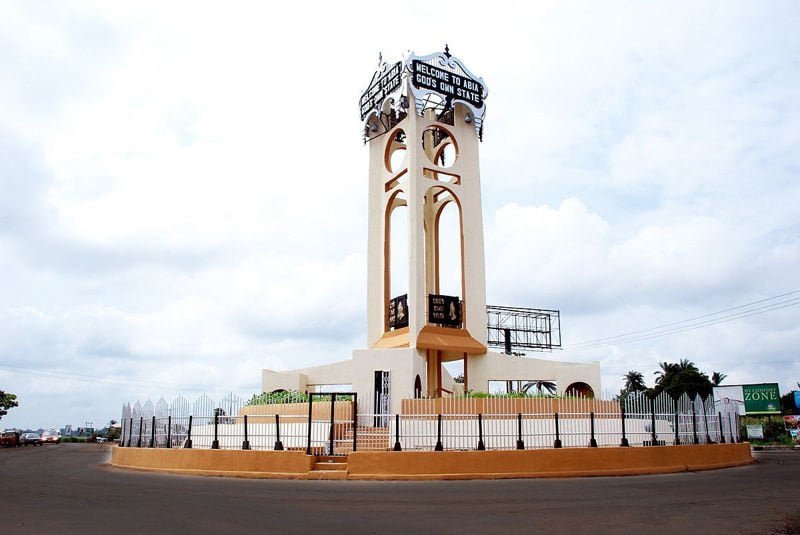By Comr Amos Kalu
This in-depth analysis provides an insightful exploration of the political future of Abia State. With a comprehensive overview of the current political landscape, this article will examine the various factors that could shape the state’s political future, such as the just concluded elections, the role of the youth, and the impact of the government’s policies. It will also look at the potential implications of these factors and how they could affect the political trajectory of Abia State. By delving into the complexities of the political landscape, this article will provide readers with a better understanding of the state’s political future.
Abia State’s Political History and Its Impact on the Future
Abia State is located in the southeastern region of Nigeria and is one of the 36 states in the country. It was created in 1991 from the former Imo State and is bordered by Rivers State to the south, Ebonyi State to the east, Enugu State to the west, and Anambra State to the north Abia State is home to a diverse population of over 3 million people and is one of the most populous states in Nigeria.
The political history of Abia State has been marked by several significant events. In the early 1990s, Abia State was created from the former Imo State and the first civilian governor of the state was Chief Ogbonnaya Onu. Under his leadership, the state experienced a period of economic growth and development. In 1999, Chief Orji Uzor Kalu was elected as the governor of Abia State and he held office until 2007. During his tenure, he implemented several economic and social reforms that had a positive impact on the state.
The political history of Abia State has also been marked by several controversies when the Supreme Court declared Chief Theodore Orji as the rightful governor of the state. This decision was met with mixed reactions from the people of Abia State. In 2011, Chief Theodore Orji was re-elected as the governor of Abia State and he held office until 2015.
The political history of Abia State has had a significant impact on the future of the state. The state has experienced a period of economic growth and development under the leadership of its governors. The state has also seen an increase in investment in infrastructure and social services. The political stability of the state has also enabled it to attract more foreign investment and businesses.
The political history of Abia State has also had an impact on the state’s social and cultural landscape. The state has experienced a period of peace and stability which has enabled the people of the state to pursue their cultural and religious practices without fear of persecution. This has also enabled the state to attract more tourists and visitors from other parts of the country and the world.
Abia state has experienced a period of economic growth and development under the leadership of its governors. The state has also an increase in investment in infrastructure and social. The political stability of the state has enabled it to attract more foreign investment businesses. The state has seen a boost in its cultural and religious life which has enabled the people to pursue their cultural and religious practices without fear of persecution. The political history of Abia State has had a positive impact on the future of the state and will continue to do so in the years to come.
Assessing the Current Political Landscape of Abia State
As I’ve earlier stayed, Abia State is a state in southeastern Nigeria. It is one of the 36 states that make up the Federal Republic of Nigeria. Abia State is bordered by Imo, Anambra, Enugu, Ebonyi, and Rivers States. The capital of Abia State is Umuahia, and the state is divided into 17 Local Government Areas.
Assessing the current political landscape of Abia State requires an understanding of the state’s history and its current political situation. Abia State was created in 1991 from the former Imo State. Since then, Abia State has been governed by a number of different political parties. The current governor of Abia State is Okezie Ikpeazu, who was elected in 2015. He is a member of the People’s Democratic Party (PDP).
The current political landscape of Abia State is dominated by the PDP. The PDP has held power in the state since 1999 and has won every gubernatorial election since then. The PDP also holds a majority of the seats in the Abia State House of Assembly. However, this status quo was challenged and upset in the 2023 general election when the Obidient Movement moved across the political landscape of Nigeria like a tsunami. Like every other state in Nigeria, Abia state was not soared. With the emergence of Dr Alex Otti of the Labour Party, the table turned and PDP lost its grip of power in 1999.
The opposition parties in Abia State are the All Progressives Congress (APC) and the All Progressives Grand Alliance (APGA). The APC has been the main opposition party in the state since 2011 when it won several seats in the state House of Assembly. The APGA has also made some gains in recent years, winning several seats in the state House of Assembly in 2019. However, the Labour Party has proven to be a bride of the future in Abia politics after it makes a tremendous impact, but pundits believe that the excitement will die down and realities will return to the status quo. Only the future can discern that.
In addition to the major political parties, there are several smaller parties in Abia State. These include the New Nigeria People’s Party (NNPP), the Social Democratic Party (SDP), and the African Democratic Congress (ADC), These parties have not been as successful as the major parties in recent elections, but they still play an important role in the political landscape of the state.
Overall, the current political landscape of Abia State is dominated by the PDP. The opposition parties have made some gains in recent years, but the PDP remains the dominant force in the state. The smaller parties also play an important role in the state’s politics, but they have not been as successful as the major parties in recent elections.
Analyzing the Role of Traditional Leaders in Abia State Politics
Abia State has a long and complex history of traditional leadership. Traditional leaders, known as the Eze, have been integral to the political, social, and economic life of the state since its founding in 1991.
The Eze are responsible for representing the interests of their communities and providing guidance to their people. They are also responsible for mediating disputes and ensuring that justice is served. In addition, they are expected to provide leadership in times of crisis and to help maintain the stability of the state.

The Eze are elected by their communities and are expected to serve for life. They are expected to be knowledgeable in the laws and customs of their people and to act as a bridge between the people and the government. They are also expected to serve as an advocate for their people and to ensure that their rights are respected.
The Ezes have a long history of playing a role in Abia State politics. They have been instrumental in helping to shape the state’s constitution and in ensuring that the rights of the people are respected. They have also been involved in negotiations with the government on issues such as land rights and taxation.
The Eze has also been involved in the development of the state’s economy. They have worked to promote economic growth and development by encouraging investment and creating jobs. They have also been involved in the promotion of education and health care in the state.
As such, they have played an important role in the state’s political life and have helped to ensure that the rights of the people are respected.
Examining the Role of Political Parties in Abia State’s Political Future
The role of political parties in Abia State’s political future is of paramount importance. Political parties are the primary vehicle through which citizens participate in the democratic process and influence the decisions of their government. In Abia State, political parties have been instrumental in the election of state governors, members of the state legislature, and local government officials. They have also been involved in the formulation of policy, the development of programs, and to promote civic engagement
Political parties in Abia State are divided into two main groups: the People’s Democratic Party (PDP) and the All Progressives Congress (APC). The PDP is the ruling party in Abia State and has been in power since 1999. The APC is the main opposition party and has been gaining ground in recent years. Both parties have a strong presence in the state and are actively involved in the political process.
This means that political parties must be transparent in their activities and accountable for their actions. Political parties should also be open to new ideas and be willing to work with other political parties to achieve common goals.
In addition, political parties in Abia State should focus on developing policies that are beneficial to the citizens of the state. This includes policies that promote economic growth, job creation, and improved public services. Political parties should also strive to ensure that their candidates are well informed and qualified to serve in public office.
Finally, political parties in Abia State should strive to build strong relationships with the citizens of the state. This includes engaging with citizens through public forums, town hall meetings, and other forms of public outreach. Political parties should also work to ensure that their candidates are accessible to the public and that their policies are in line with the interests of the citizens of the state.
Overall, political parties play an important role in Abia State’s political future. They are the primary vehicle through which citizens participate in the democratic process and influence the decisions of their government. To ensure that political parties remain relevant in Abia State’s political future, they must remain accountable to the citizens of the state and focus on developing policies that are beneficial to the citizens of the state.
Investigating the Potential for Electoral Reform in Abia State
Electoral reform is an important issue in Abia State, Nigeria. It is essential for ensuring fair and free elections, as well as promoting democracy and good governance. In recent years, there have been several initiatives to investigate the potential for electoral reform in Abia State.
The Abia State Independent Electoral Commission (ABSIEC) is responsible for conducting elections in the state. The commission has been working to ensure that elections are conducted in a free and fair manner. In 2017, the commission conducted a series of consultations with political parties, civil society organizations, and other stakeholders to discuss the potential for electoral reform in Abia State.
The consultations focused on a range of issues, including voter registration, the of technology in elections, role of the media in, and the enforcement of laws. The consultations revealed there was a need for voter processes, better enforcement of laws, and the use of technology in elections.
The ABSIEC has also been working to strengthen the electoral process in Abia State. In 2018, the commission launched a voter education campaign to inform citizens about their rights and responsibilities during elections. The commission also launched a voter registration drive to ensure that all eligible citizens are registered to vote.
In addition, the ABSIEC has been working to improve the use of technology in elections. The commission has been working with technology companies to develop a mobile voting system that will allow citizens to cast their votes remotely. This system is expected to be implemented in the 2021 elections.
The ABSIEC has also been working to strengthen the enforcement of electoral laws. The commission has been working with the police and other law enforcement agencies to ensure that electoral laws are enforced. The commission has also been working to improve the monitoring of elections to ensure that the results are accurate and free from manipulation.
Overall, the ABSIEC has been working to investigate the potential for electoral reform in Abia State. The commission has been working to ensure that elections are conducted in a free and fair manner and that citizens are informed about their rights and responsibilities during elections. The commission has also been working to strengthen the enforcement of electoral laws and to improve the use of technology in elections. These efforts are essential for ensuring that elections in Abia State are free and fair.
Copyright Warning!
Disclaimer
Just to let you know, comments expressed here do not reflect the opinions of OHAFIATV News or any employee thereof. Also, every opinion expressed in any article is strictly that of the author(s), except where otherwise stated.


